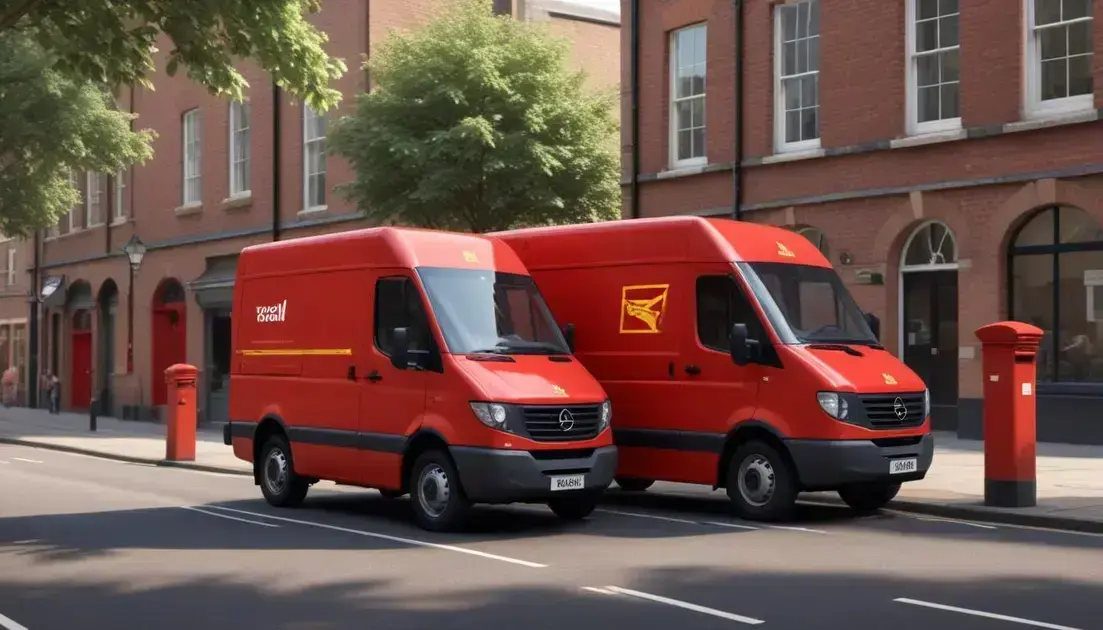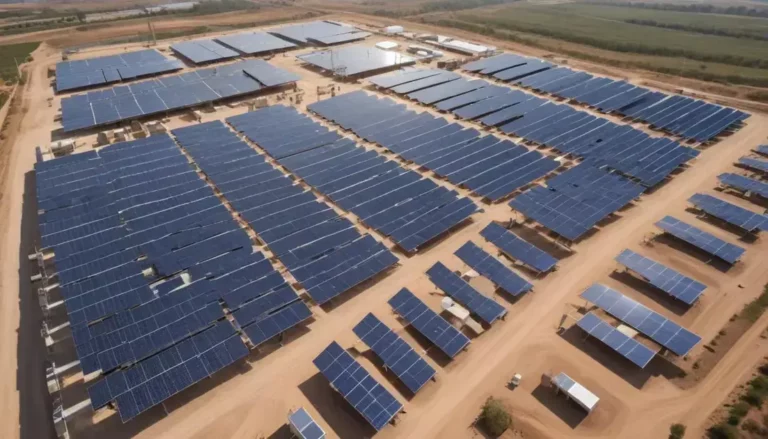Royal Mail’s Journey to Carbon Neutrality by 2040
Supply chain sustainability focuses on minimizing environmental impact through innovative practices, such as using electric vehicles and optimizing routes, enabling companies like Royal Mail to achieve carbon neutrality by 2040.
In the quest for carbon neutrality, Supply Chain Sustainability has become a crucial topic. Discover how Royal Mail is leading the charge through innovative partnerships and strategies.
The importance of supply chain emissions
Understanding supply chain emissions is crucial for companies aiming to reduce their carbon footprint. These emissions occur at various stages, from sourcing raw materials to delivering finished products. By identifying and addressing these emissions, businesses can significantly lower their overall environmental impact.
One effective strategy is conducting a comprehensive audit of the supply chain. This process helps companies pinpoint the areas with the highest emissions. For example, logistics and transportation often contribute significantly to emissions, making them key focus points. By optimizing these areas, companies can achieve substantial reductions in their carbon output.
Furthermore, collaboration with suppliers is essential. By working together, businesses can implement more sustainable practices, such as using renewable energy sources or adopting cleaner transportation methods. This mutual commitment not only enhances sustainability efforts but also drives innovation within the supply chain.
Companies also gain a competitive edge by prioritizing sustainability. Consumers increasingly favor businesses that demonstrate environmental responsibility. Thus, reducing supply chain emissions can lead to stronger brand loyalty and improved market position.
How Watershed aids Royal Mail’s sustainability efforts
Watershed plays a pivotal role in enhancing Royal Mail’s sustainability initiatives. By leveraging advanced technology, Watershed assists in accurately tracking and calculating greenhouse gas emissions across the supply chain. This real-time monitoring allows Royal Mail to identify key areas for improvement.
One of the main advantages of using Watershed is its ability to provide actionable insights. These insights enable Royal Mail to make informed decisions that prioritize environmental sustainability. For instance, by analyzing emissions data, Royal Mail can optimize its delivery routes, reducing fuel consumption and thereby lowering emissions.
Additionally, Watershed promotes transparency within the supply chain. By sharing emissions data with stakeholders, including suppliers and customers, Royal Mail fosters collaboration on sustainability efforts. This collective approach enhances accountability and drives meaningful change within the logistics sector.
Another significant feature of Watershed is its focus on long-term sustainability goals. The platform not only helps Royal Mail meet immediate targets but also aligns with their vision of achieving carbon neutrality by 2040. This strategic partnership exemplifies how technology can facilitate sustainable practices in traditional industries.
Royal Mail’s ambitious targets for carbon neutrality
Royal Mail has set ambitious targets for achieving carbon neutrality by 2040. This goal is part of a broader commitment to reduce its environmental impact significantly. The company recognizes that reaching this target requires a multifaceted approach that addresses every aspect of its operations.
One key component of Royal Mail’s strategy is the transition to sustainable logistics. This includes adopting electric vehicles for delivery, which can drastically cut down on greenhouse gas emissions. The company plans to expand its fleet of electric vans, enhancing delivery efficiency while contributing to cleaner air.
Another important aspect is the use of renewable energy sources in its facilities. Royal Mail aims to power its operations with green energy, further reducing its carbon footprint. By retrofitting existing buildings and investing in solar panels, the company can generate clean energy directly from its infrastructure.
Furthermore, Royal Mail is focused on engaging with stakeholders, including suppliers and customers, to promote sustainability. This collaborative effort aims to encourage eco-friendly practices throughout the supply chain. By fostering a culture of sustainability, Royal Mail is poised to lead the logistics industry towards a greener future, showcasing that ambitious targets can pave the way for significant environmental change.
Future outlook for sustainable logistics
The future of sustainable logistics is promising as businesses increasingly prioritize environmental responsibility. Companies are expected to adopt greener practices that minimize their carbon footprints while satisfying customer demands for sustainability.
Innovative technologies, such as automation and artificial intelligence, will play significant roles in enhancing efficiency. For instance, AI can optimize supply chain routes, ensuring quicker deliveries with lower emissions. This level of precision not only improves operational efficiency but also supports sustainability goals.
Furthermore, the shift towards electric and alternative fuel vehicles is set to dominate the logistics landscape. As charging infrastructure develops, companies will increasingly integrate electric fleets to reduce reliance on fossil fuels. This transition will not only lower emissions but also lead to significant cost savings over time due to reduced fuel expenses.
Collaboration among stakeholders will become vital in achieving sustainability targets. Partnerships between freight companies, suppliers, and technology providers will foster innovation and share best practices. By working together, these parties can create comprehensive sustainability frameworks that address emissions at every stage of the supply chain.
Looking Ahead: The Path to Sustainable Logistics
As we look to the future, the importance of sustainable logistics cannot be overstated. Companies like Royal Mail are leading the way by setting ambitious goals and utilizing innovative technology.
By focusing on sustainability, businesses not only help the environment but also meet the growing demands of eco-conscious consumers. The integration of electric vehicles and AI in logistics will revolutionize the industry, creating a more efficient and responsible supply chain.
Collaboration among different stakeholders will be key to success. Together, they can foster new ideas and practices that reduce emissions and promote sustainability across the board.
In conclusion, embracing sustainable logistics is essential for both business success and environmental health. The journey may be challenging, but the rewards will benefit everyone.
Frequently Asked Questions
What is the importance of sustainable logistics?
Sustainable logistics help reduce the carbon footprint of businesses by minimizing emissions during transportation and delivery, addressing growing environmental concerns.
How can technology improve supply chain sustainability?
Technology such as AI and automation optimizes routes and increases efficiency, leading to lower fuel consumption and reduced emissions throughout the supply chain.
What role does collaboration play in achieving sustainability goals?
Collaboration among stakeholders, including suppliers and logistics companies, enhances innovation and best practices, ensuring a unified approach to reducing emissions.
What are Royal Mail’s targets for carbon neutrality?
Royal Mail aims to achieve carbon neutrality by 2040, focusing on sustainable practices, including the transition to electric vehicles and renewable energy sources.
What benefits does using electric vehicles provide to logistics companies?
Electric vehicles reduce greenhouse gas emissions and lower fuel costs, making operations more environmentally friendly while improving company sustainability image.
How can consumers support sustainable logistics initiatives?
Consumers can choose to support companies that prioritize sustainability by seeking out eco-friendly practices in their shipping and delivery options.






